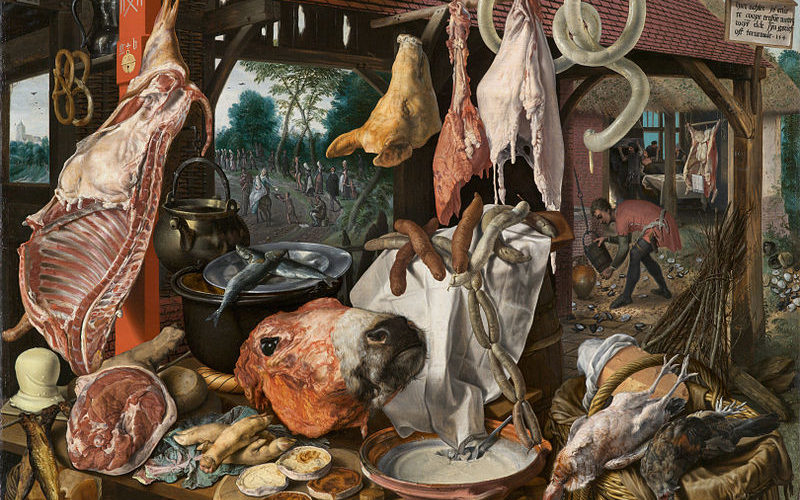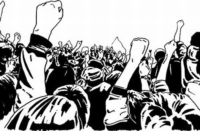It’s over a hundred years since Upton Sinclair wrote his ground-breaking novel The Jungle (1906). It catapulted him to fame and set a fire under President Theodore Roosevelt to introduce food safety regulations, in response to which Sinclair worried that his original message had been missed. “I aimed at the public’s heart,” he famously remarked, “and by accident I hit it in the stomach.”
He hoped for socialist revolution but had to settle for accurate food-labelling.
The consumption of meat is the hot topic of the day, with environmental and health concerns listed alongside discussions of animal cruelty, the impossibility of humane farming, and the notion that the human race has outgrown meat. Little attention has been paid to the struggles of the workers who supply the meat itself.
The peak of slaughterhouse unionisation has long since past. In the United States, workers earn 30 per cent less than the manufacturing average, and it is an industry rife with low pay also in Britain and Ireland.
The decline began in the United States during the 1980s, when such new companies as Iowa Beef Processors showed up on the scene. By harking back to the dreaded pace-setters of the 1900s, and introducing more efficient mechanised “disassembly lines,” they were able to buy up smaller meat-processing factories and eventually to challenge the industry giants. The Big Four became the Even Bigger Three and moved premises out of cities, to be closer to the cattle feedlots they controlled.
All these factors, together with the anti-union and anti-worker legislation introduced in the United States, and the dissolution of the Soviet Union, have revived conditions in the slaughter industry that are reminiscent of those that Sinclair hoped to end.
In 2005, Human Rights Watch published a report entitled Blood, Sweat, and Fear: Workers’ Rights in US Meat and Poultry Plants, which concluded that working conditions in America’s meat-packing plants were so bad that they violated basic human rights. This was the first time that Human Rights Watch had criticised any American industry. One particularly gruesome finding was that workers in some of the larger firms had taken to wearing adult nappies on the line, as they were routinely denied toilet breaks.
The US Bureau of Labor Statistics reports twice as many injuries and illnesses among meat-packing employees as in the average of American manufacturing jobs—a number that many unions contend should be much higher, as workers are routinely intimidated out of reporting and into withdrawing claims for compensation.
These conditions are not confined to the United States. In 2017 one in four British slaughterhouses were found to be in violation of worker, animal or food health regulations. The Health and Safety Executive said that the slaughter industry was at the top end of its concern level for injury rates. Its study in 2018 found that in the six previous years 800 British abattoir workers suffered serious injuries, 78 required amputations, and 4 died while at work.
These numbers ignore the high rate of perpetration-induced traumatic stress, a form of post-traumatic stress disorder common for abattoir workers, as well as the increased rates of domestic violence and drug and alcohol abuse to be found within this section of the population after their employment there. Slaughterhouses and meat-packing work, together with farming and supply chains for meat production, also have one of the highest rates of trafficked and undocumented workers employed; and, given their precarious legal situation, employers are able to ruthlessly exploit them.
Much like the way in which workers engaged in the production of weaponry have no say in declaring war, those employed in meat production are not our enemy, nor the cause of the ills of the industry. But, again like arms manufacturing, it is an industry we must examine clearly and ultimately be critical of.
As communists, we must walk a fine line between our desire to support the struggles of workers and remaining steadfast in our ideological positions, even if that means actively campaigning against the continued manufacture of arms, or against meat, fur and dairy production, which will ultimately put those workers out of a job. We have a duty to provide a broader analysis of those industries and the impact they have on the wider world.
Meat production is one of the most profitable, most destructive and most unnecessary industries. Increased meat production has led to deforestation of the Amazon for cattle ranches. Research shows that without meat and dairy consumption the global use of farmland could be reduced by more than 75 per cent and still feed the world. Meat and dairy provide only 18 per cent of the calories and 37 per cent of the protein consumed globally but use 83 per cent of farmland and produce 60 per cent of agriculture’s greenhouse gas emissions. Even the lowest-impact meat and dairy products cause much more environmental harm than the least-sustainable vegetable and cereal-growing.
A shift to a meat-free diet is the only safe option for feeding a growing world population without further deforestation, the loss of biodiversity, and extinctions.
Closer to home, animal agriculture in Ireland is responsible for 94 per cent of our output of nitrous oxide—296 times more destructive to the environment than carbon dioxide, the leading cause of loss of biodiversity and natural habitats and of fresh-water pollution. While there may be no ethical consumption under capitalism, given these statistics it will not be possible to ethically consume meat under a socialist system either.
This is without even beginning to touch on the fact that meat production relies on the systematic reduction of living creatures to the level of a resource that can be owned, to be profited from. If these animals are not, at best, viewed as a resource they are an unwanted by-product and are treated accordingly, their lives, their pain, irrelevant under capitalism.
In egg farms, male chicks have no use, as they do not lay and are unsuitable for poultry production. The recommended practice is that they be discarded through maceration. This is when living chicks are placed in a large high-speed grinder. This is routinely employed in Ireland as the preferred method over suffocation in bags or breaking the neck, as the other options cannot be mechanised in the same manner.
“The food we eat masks so much cruelty. The fact that we can sit down and eat a piece of chicken without thinking about the horrendous conditions under which chickens are industrially bred in this country is a sign of the dangers of capitalism, how capitalism has colonised our minds. The fact that we look no further than the commodity itself, the fact that we refuse to understand the relationships that underlie the commodities that we use on a daily basis.”
Angela Davis.
We must challenge the old credo of the meat-packing giant Armour, “We feed the world,” and show that we can do it without the exploitation of the earth, of our fellow-humans, or of any other living creature.






